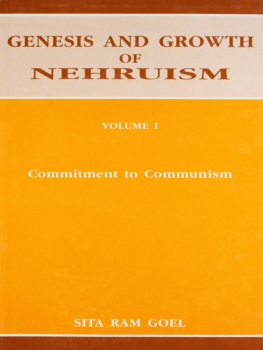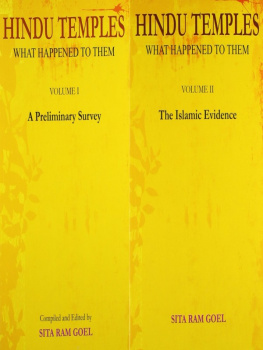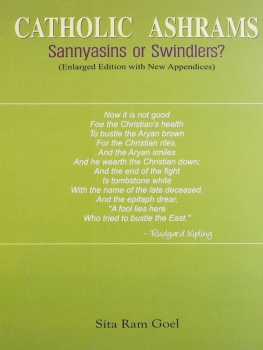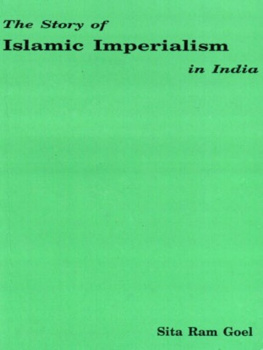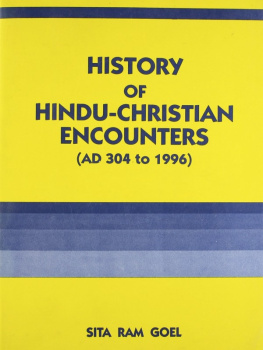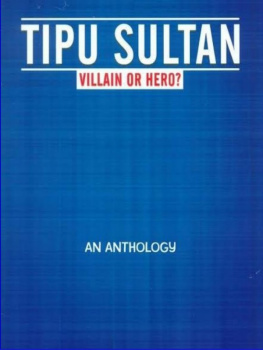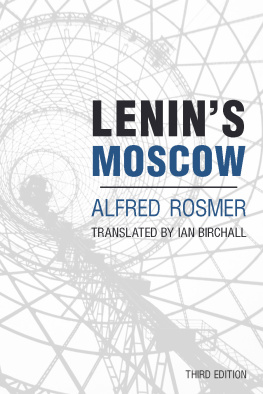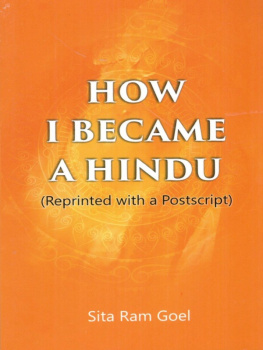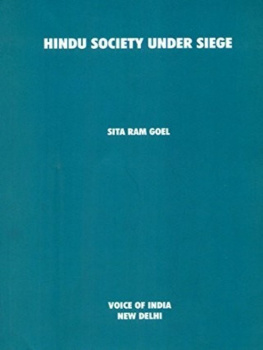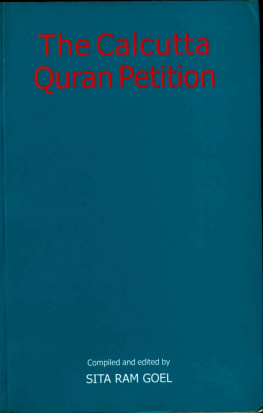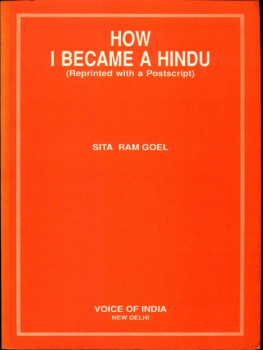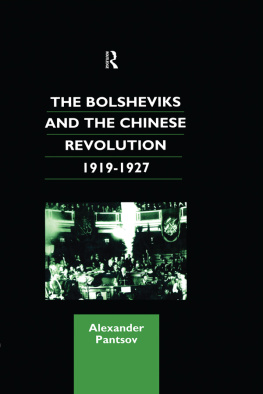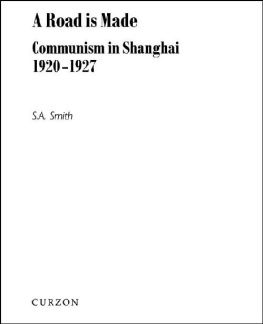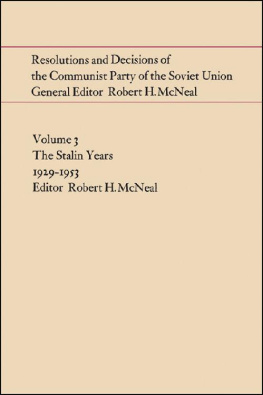Sita Ram Goel - Genesis And Growth Of Nehruism: Volume I: Commitment to Communism
Here you can read online Sita Ram Goel - Genesis And Growth Of Nehruism: Volume I: Commitment to Communism full text of the book (entire story) in english for free. Download pdf and epub, get meaning, cover and reviews about this ebook. year: 1993, publisher: Voice Of India, genre: Politics. Description of the work, (preface) as well as reviews are available. Best literature library LitArk.com created for fans of good reading and offers a wide selection of genres:
Romance novel
Science fiction
Adventure
Detective
Science
History
Home and family
Prose
Art
Politics
Computer
Non-fiction
Religion
Business
Children
Humor
Choose a favorite category and find really read worthwhile books. Enjoy immersion in the world of imagination, feel the emotions of the characters or learn something new for yourself, make an fascinating discovery.
- Book:Genesis And Growth Of Nehruism: Volume I: Commitment to Communism
- Author:
- Publisher:Voice Of India
- Genre:
- Year:1993
- Rating:3 / 5
- Favourites:Add to favourites
- Your mark:
- 60
- 1
- 2
- 3
- 4
- 5
Genesis And Growth Of Nehruism: Volume I: Commitment to Communism: summary, description and annotation
We offer to read an annotation, description, summary or preface (depends on what the author of the book "Genesis And Growth Of Nehruism: Volume I: Commitment to Communism" wrote himself). If you haven't found the necessary information about the book — write in the comments, we will try to find it.
Genesis And Growth Of Nehruism: Volume I: Commitment to Communism — read online for free the complete book (whole text) full work
Below is the text of the book, divided by pages. System saving the place of the last page read, allows you to conveniently read the book "Genesis And Growth Of Nehruism: Volume I: Commitment to Communism" online for free, without having to search again every time where you left off. Put a bookmark, and you can go to the page where you finished reading at any time.
Font size:
Interval:
Bookmark:
sanatanajnana
This book was produced in EPUB format by the Internet Archive.
The book pages were scanned and converted to EPUB format automatically. This process relies on optical character recognition, and is somewhat susceptible to errors. The book may not offer the correct reading sequence, and there may be weird characters, non-words, and incorrect guesses at structure. Some page numbers and headers or footers may remain from the scanned page. The process which identifies images might have found stray marks on the page which are not actually images from the book. The hidden page numbering which may be available to your ereader corresponds to the numbered pages in the print edition, but is not an exact match; page numbers will increment at the same rate as the corresponding print edition, but we may have started numbering before the print book's visible page numbers. The Internet Archive is working to improve the scanning process and resulting books, but in the meantime, we hope that this book will be useful to you.
The Internet Archive was founded in 1996 to build an Internet library and to promote universal access to all knowledge. The Archive's purposes include offering permanent access for researchers, historians, scholars, people with disabilities, and the general public to historical collections that exist in digital format. The Internet Archive includes texts, audio, moving images, and software as well as archived web pages, and provides specialized services for information access for the blind and other persons with disabilities.
Created with abbyy2epub (v.1.7.6)
Foreword by Philip Spratt 3
First Preface 6
II . 7
III . 13
IV . 16
V . 20
VI . 21
VII . 21
Second Preface 23
II . 25
III . 30
IV . 35
In Search of a Culprit 36
A Pilgrim to the Soviet Paradise 42
Historian With Communist Glasses 49
An Indefatigable Soviet Enthusiast 56
An Incurable Soviet-Addict 63
An Apologist for Soviet Sins 70
A Persistent Pro-Soviet Speaker 76
A Devoted Disciple of Stalin 83
A Fellow-Traveller of Soviet Foreign Policy-1 92
A Fellow-Traveller of Soviet Foreign Policy-2 100
A Fellow-Traveller of Soviet Foreign Policy-3 108
A Fellow-Traveller of Soviet Foreign Policy-4 116
A Fellow-Traveller of Soviet Foreign Policy-5 124
A Fellow-Traveller of Soviet Foreign Policy-6 132
A Fellow-Traveller of Soviet Foreign Policy-7 140
A Fellow-Traveller of Soviet Foreign Policy-8 151
A Promoter of the Communist Party 159
Postscript (1993). 167
Sappers and Miners of Communism 175
II.182
Choosing Between Usa and Ussr 188
II .190
III .193
IV .196
Why is there so much puzzlement about the politics of Jawaharlal Nehru? As Goel reminds us, and every newspaper reader can recall, he himself frequently says that he agrees in principle with the Communists. Why is he not taken at his word?
We do not take him at his word, because he says and does many other things, and so we do not realise how closely the relevant parts of his policy accord with this particular avowal. When I read the articles in this book, I was quite surprised. He is a very much more faithful Communist than I had realised.
But the principal reason why we do not fully accept his own statements that he is a Communist is that our image of the Communist is so different. We think of the Communist as a man with no interests ourside politics, a fanatic working furiously for the cause, an offensive, truculent person, or if he has to indulge in camouflage, a wily deceiver, and at all times a docile follower of the party line. That is not a false picture, but there are many whom it does not fit. Many Communists are also ambitious; many have a liking for the fleshpots; some have serious interests outside politics, though their theory assures them that there is nothing outside politics; no doubt there are some who do not accept the more abstract parts of the Communist theory, as there are certainly many who ignore it; and there are some, even within the party, who are not slavish followers of the party line.
Nehru is a Communist in this broader sense. He accepts increasing governmental power, socialisation and mechanisation, as both inevitable and desirable. He is strongly attached to the existing Communist governments, and when they clash with other governments he almost invariably supports them. He is in a sense aware of the dark side of Communism as it has existed up to now, but he neutralises this awareness by the Communist procedure of considering history in block-stages. The bourgeois era is thus made responsible for all the unpleasant things that have happened in the past few centuries, and the facts that some bourgeois systems have outgrown many of the old evils, and that it appears possible to achieve a bourgeois world system which would be much preferable to the Communist world system, are ignored. The Marxian scheme of block-stages does not contemplate such facts.
Here, it is true, Nehru may deviate somewhat from the orthodox Communist position. The bourgeois world system was sketched by Woodrow Wilson. It provides for substantially independent nations, running their internal affairs in their own way, under a very limited world authority, like the League or the U.N. The Communists insist on substantial uniformity, through a Communist Party monopoly of power, in the internal affairs of all nationas, and until the rise of polycentrism they contemplated a highly centralised world government. Wisdom may be dawning on them now, but we do not yet know how far they will go.
In this controversy Nehru no doubt stands with the revisionists, but that is a matter
of little immediate importance. On the questions that arise now, though he looks so different he is a Communist in practice. The figure in world politics who most resembles him is Castro. Castro got into power on false pretences, i.e. as a liberator, not as a Communist, but within a year or so he had liquidated his opponents and built up the Communists so far that he was able to drop the mask. Nehru got into power on the same false pretences, i.e. as a liberator, not as a Communist, and he has proceeded in the same direction, but far more cautiously. Castro succeed Batista; Nehru succeeded Gandhi on the one hand, and the legalistic British regime on the other. The two legacies between them have cramped his Communist style. Nehru has sometimes sighed for a cadre such as Mao Tse-tung built up during the Long March. With such a cadre he might not have lagged so far behind Castro. But such a cadre, while it might have enabled him to enforce Communism, would not have made it any more congenial to India. Communism is the policy of a small group of intellectuals, who are building a governing machine with a vested interest in Communism, but it remains wholly alien to this conservative, religious, individualistic, property-conscious, peasant-minded country. Just as in Russia and China, Communism can be forced upon India only by a usurper regime.
When I have argued in this way, people object that Nehru has made no attempt to impose the Communist policy in regard to religion, education, freedom of opinion, personal liberty, and so on. The Gandhian legacy has been too strong; if he had tried he would have been overthrown. But through a series of constitutional amendments, he has systematically cut down the right to property, which most theorists regard as a necessary bulwark, in the long run, of the other freedoms. As for civil, religious and intellectual liberty, the Communists always profess to respect them. They are fully provided for in the Soviet constitution. Stalin himself claimed to recognise the necessity for discussion and the clash of opinions. But in practice Communists concentrate all power in the hands of the government, leaving no countervailing force to balance it. Consequently, the libertarian provisions of their constitution cannot be enforced. They are totally ignored in practice, and it is more than anyones life is worth to protest. Nehrus attitude in this matter is, therefore, in accordance with the abstract theory of Communism. What he would have done if he had enjoyed total power is anyones guess.
Font size:
Interval:
Bookmark:
Similar books «Genesis And Growth Of Nehruism: Volume I: Commitment to Communism»
Look at similar books to Genesis And Growth Of Nehruism: Volume I: Commitment to Communism. We have selected literature similar in name and meaning in the hope of providing readers with more options to find new, interesting, not yet read works.
Discussion, reviews of the book Genesis And Growth Of Nehruism: Volume I: Commitment to Communism and just readers' own opinions. Leave your comments, write what you think about the work, its meaning or the main characters. Specify what exactly you liked and what you didn't like, and why you think so.

